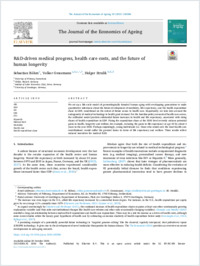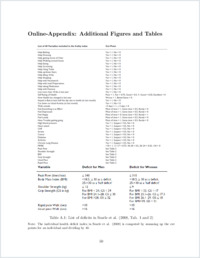R&D-driven medical progress, health care costs, and the future of human longevity
BP2-STS
- Böhm, Sebastian University of Fribourg
- Grossmann, Volker ORCID University of Fribourg
- Strulik, Holger ORCID University of Goettingen
- 20.10.2020
Published in:
- The Journal of the Economics of Ageing. - Elsevier BV. - 2021, vol. 18, p. 100286
English
We set up a life-cycle model of gerontologically founded human aging with overlapping generations to make quantitative inferences about the future development of morbidity, life expectancy, and the health expenditure share in GDP, conditional on the extent of future access to health care. Importantly, we take into account the endogeneity of medical technology to health good demand. For the baseline policy scenario of health care access, the calibrated model predicts substantial future increases in health and life expectancy, associated with rising shares of health expenditure in GDP. Fixing the expenditure share at the 2020 level severely reduces potential gains in health, longevity and welfare; for example, reducing the gains in life-expectancy at age 65 by about 4 years in the year 2050. Perhaps surprisingly, young individuals (i.e.those who would save the most health care contributions) would suffer the greatest losses in terms of life expectancy and welfare. These results reflect reduced incentives for medical R&D.
- Faculty
- Faculté des sciences économiques et sociales et du management
- Department
- Département d'économie politique
- Language
-
- English
- Classification
- Economics
- License
- Open access status
- hybrid
- Identifiers
-
- DOI 10.1016/j.jeoa.2020.100286
- ISSN 2212-828X
- Persistent URL
- https://folia.unifr.ch/unifr/documents/322003
Other files
Statistics
Document views: 69
File downloads:
- 1-s2.0-S2212828X20300517-main.pdf: 175
- supplementary data.pdf: 54

